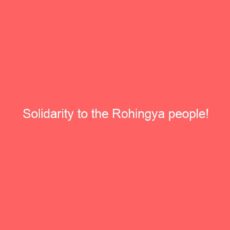In the home, they become more vulnerable to abuse. Due to the strict imposition of quarantine protocols, women and children are forced to stay indoors leaving them locked with their perpetrators and abusers.
Victims are left with little option to report their abusers. The lack of policy and implementation mechanisms to assure accessibility of VAWC help desks to women and children in the middle of the pandemic is an added factor in decrease in reporting. Not only that, domestic violence reported in the community is usually reduced to “family problems” and victims are forced to stay in abusive relationships.
The internet is no safe space for women and children either. There is an alarming increase in incidence of online prostitution and child pornography amid the pandemic. Because of lack of options for livelihood, victims resort to selling pictures and videos of themselves online in order to provide for the family.
Poor government response to the pandemic greatly affects the vulnerability of women and children to violence against them. The militarist approach to the pandemic has caused more harm than good. Just from March to October 2020, the Center for Women’s Resources (CWR) monitored 5 cases of state-perpetrated VAW. One of these cases is that of San Juan, Ilocos Sur sergeants Randy Ramos and Marawi Torda who killed a 15 year old girl who tried to report the rape of her and her 18 year old cousin. The victim was found dead hours after she reported the incident to police. To this date, justice is yet to be served as the two police officers still walk free.
The culture of impunity continues to prevail because even before the pandemic, President Duterte himself enables and encourages abuse from state forces, coddles them, and even ensures them that they will not be held liable for their violations. His series of remarks and actions that violate the rights of women sends a clear message: “Dapat Mayor muna ang mauna.” This allows all perpetrators, especially those in power, to commit such violations, certain that their acts will go unpunished. Moreover, this silences victims of abuse, and further discourages them to come forward.
This women’s month, let’s amplify our calls for the urgent protection and promotion of women’s right to be free from any form of violence. Services to address gender-based abuses must be improved, including increased funding to support shelters, hotlines and online counselling. Essential services should be expanded and adapted to the crisis context to ensure women’s access to support. It is vital to hold perpetrators to account, especially state forces who are supposed to protect women from abuses, but are emboldened to abuse women even amid a pandemic.
Finally, it is important to reiterate the state’s obligation to eliminate violence against women and children both in public and private life.

